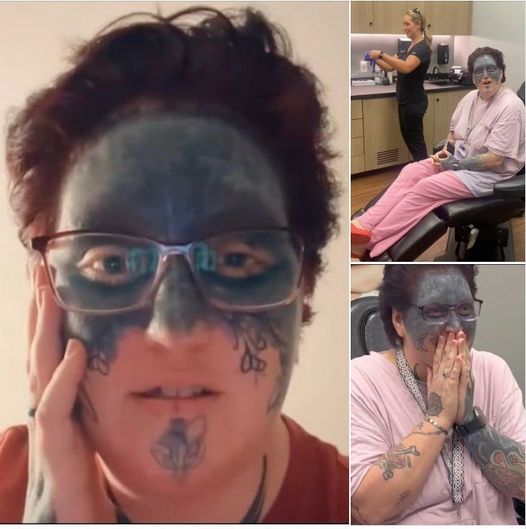However, a kind stranger’s gesture changed everything for her.
Hailing from Florida, Taylor recounted how she was mistreated by a former boyfriend. On her 21st birthday, while out celebrating, something terrible occurred, but the details remain hazy. She awoke in a hotel feeling injured and distressed, only to discover horrifying tattoos adorning her face when she looked in the mirror.
Taylor attempted to hide the tattoos with makeup, but her efforts were wasted. Her boss noticed the tattoos peeking through the makeup, prompting a crucial realization: she couldn’t continue living like this.Her boss empathetically told her: “You can’t live like this,” and generously offered to cover the tattoos with blackout ink, providing her with a chance at a “normal life.” In 2008, Taylor agreed to the procedure, yet despite this, she continued facing rejections in her job search due to her facial tattoos.
Then, a remarkable turn of events unfolded when a TikTok user known as TheDadBot stumbled upon Taylor’s livestream. Intrigued by her story and videos discussing her struggles with bipolar disorder, TheDadBot felt compelled to help Taylor.
In an interview, TheDadBot, whose real name is Karridy, expressed how Taylor’s challenges deeply resonated with him, recognizing how they hindered her from reaching her full potential. Motivated to assist, Karridy generously offered to cover the expenses of Taylor’s tattoo removal and reached out to numerous clinics to facilitate the laser surgery.Remarkably, a laser tattoo-removal company named Removery agreed to provide the removal procedure free of charge, a service that typically costs thousands of dollars.
Carmen VanderHeiden Brodie, VP of Clinical Operations at Removery, explained that the tattoo removal process could take up to two years for Taylor to become tattoo-free. However, during her initial session, Taylor was seen smiling, filled with hope for the future.
Undeterred by the lengthy removal process, Taylor harbors new aspirations post-tattoo removal, aspiring to work in the mental health care field. At 37, Taylor said: “I’m not having it removed purely for cosmetic reasons. This is really removing a part of me that I no longer represent or live in.”Taylor’s journey of shedding those unwanted facial tattoos is nothing short of remarkable. This whole process was not merely about enhancing her appearance; it was about shedding a painful chapter of her life and moving forward.
Her story serves as a poignant reminder that everyone deserves kindness and compassion, just as Taylor has proven.



